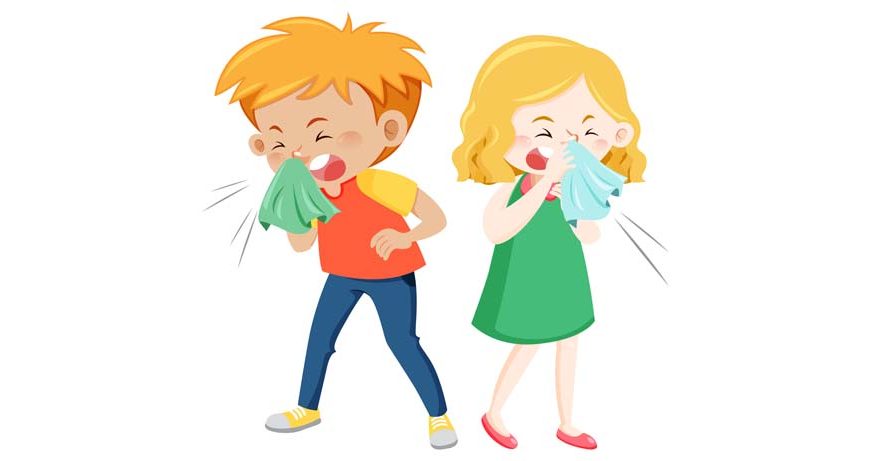‘My child is down with a Viral Infection’ The very words that every mother dreads telling someone, about their baby. Especially when the virus in question is RSV (Respiratory Syncytial Virus)!
One thing all parents should note here, is that they should not take this virus lightly, as they might have a common cold. While it is normal for RSV to ‘cause’ a common cold, it can also lead to serious issues like your baby not being able to breathe easily. This, on account of their lungs and breathing passageways being infected.
This article is an examination of everything related to the Respiratory Syncytial Virus in Babies. From a perusal of the Symptoms of RSV in Newborns, to examining RSV Prevention in Infants, we have all the information every concerned parent might need.
Let’s begin, with a look at the RSV Infection in Infants, under our exclusive Virtual Microscope!
RSV Infection in Infants: The Symptoms of RSV in Newborns
You need to watch out for the following symptoms, that will help you decipher if your baby has been infected by the RSV Virus.
- Coughing
- Sneezing
- Runny Nose
- A decrease in appetite
- Wheezing
- Fever
Note: These symptoms will usually appear anywhere between 4 to 6 days of your baby being infected with RSV. That being said, they might occur in ‘stages’, and not all at once. In the case of especially young infants, that spectrum of symptoms might be limited to merely the following:
- Difficulties in breathing
- Irritability
- A decrease in activity
Respiratory Syncytial Virus in Babies: The Treatment The treatment for the RSV virus in Babies, like the symptoms the virus causes, varies greatly. Things like the Severity of the illness and your baby’s Age, are important factors.
If you’re scared already, thinking your poor baby might have to bear the brunt of harsh antibiotics, you can rest assured that the treatment for RSV is ‘antibiotic-free’!
The following are ways in which you can treat your baby, when they have been diagnosed with RSV:
- Hydrate, hydrate, hydrate.
- Oxygenation.
- Antiviral medication.
- Tube-Feeding.
- Mucus Suctioning.
All of us have been on a ‘drip’ at some point in our lives. If normal hydration doesn’t help, ensure that they get all the fluids and electrolytes they need, through an efficient Drip.
The last thing we want to see is our baby’s face being covered with an oxygen mask. However, that might just be the need of the hour, to get them to breathe more easily!
Yes, Antibiotics won’t work because they target ‘bacteria’. Here, our target is a ‘virus’. If it gets out of hand, an ‘Antiviral’ medication might be needed, to combat it effectively.
Again, not quite the best sight to see, but it’s more important that the baby gets adequate nutrition. A thin tube will supply the liquid nutrition from the baby’s nose to their stomach.
If need be, a tube might have to be inserted into baby’s lungs, to drain the excess mucus.
RSV Infection: RSV Prevention in Infants
What’s even better than treating a baby with RSV? It’s keeping that RSV infection well at baby, so that your precious little one does not succumb to the clutches of this potentially deadly virus!
Here are the best ways, vis a vis which you can work towards RSV Prevention in Infants.
Note: While there is no ‘hundred percent’ guarantee where it comes to preventing the occurrence of RSV, it’s worth trying out the following methods of prevention.
- Taking the RSV vaccine in Pregnancy.
- Wash your hands Well, and Frequently.
- Explore your baby’s eligibility for the RSV Antibody Treatment .
- Get that Flu Shot.
- Keep them away from coughing and sneezing people.
- Operation: Destroy Germs.
The good news here is, it was only recently, in 2023, that the RSV Vaccine was approved for expectant mothers. That is, mothers in the range of 32-36 weeks of their pregnancy. It’s worth giving it a ‘shot’, where it comes to helping prevent your baby contracting the virus.
Yes, COVID is long gone, but that doesn’t give us any excuse to stop washing our hands. You want to ensure your little one indulges in the process frequently, for at least 20 seconds every hand-washing session.
Did you know that some babies are eligible for an RSV Antibody Treatment called ‘Nirsevimab’? Your baby might just be one of the lucky ones that are selected for this wonder medicine that can be administered in a single shot. All you have to do is check in with your child’s pediatrician, to see if it is appropriate for your baby.
It’s especially in the winter season that viruses like RSV are on the prowl. That’s why, it’s always better to administer a Flu Shot to your little one that Flu Shot, even when they are a tender age of 6 months. Note: If you haven’t already, you might consider taking that Flu Shot yourself!
The last thing you want is a relative who seems to have a Cold, granted access to your child. Yes, we know how important it is for everyone to get their chance where it comes to taking your little one in their arms. However, keeping sick people away from your child is a no-brainer. If they have to be near your baby, at least make sure that they don that mask we saw plenty of during the pandemic.
You want to be a Goliath where it comes to fighting those microscopic viruses that cause infections, like RSV. This is why you must regularly disinfect surfaces in your home that are commonly touched by your baby. Things like door knobs and even cell phones, that might have been contaminated by a family member or friend.
At EuroKids we encourage parents of all our children to take the threat of RSV most seriously. If you have a little one that hasn’t even started going to preschool yet, you need to be all the more careful. The next time your baby has the sniffles, don’t dismiss it as the Common Cold. It migh
















